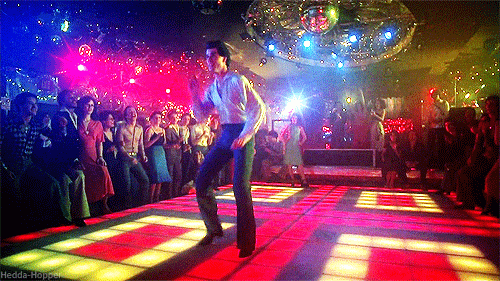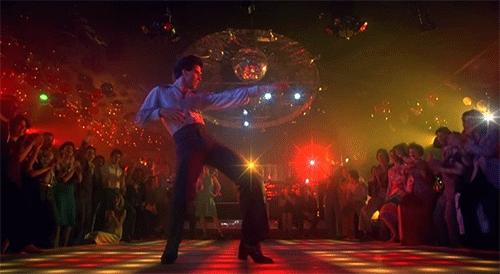The Travolta/Cage Project #7 Saturday Night Fever (1977)
I know I have written a lot about the beauty of young Nicolas Cage and John Travolta for the Travolta/Cage Project, to the point where it might seem excessive, obsessive or even unseemly. But an intense focus on physical attractiveness and the narcissism it often engenders is one of many almost uncanny commonalities between the two bad movie icons’ early careers.
It would be impossible, not to mention dishonest and inaccurate, to write about John Travolta’s superstar-making, Oscar-nominated performance in 1977’s Saturday Night Fever outside the context of the actor’s pouty, androgynous gorgeousness because John Badham’s grimly realistic masterpiece is in many ways about the cruelty of beauty. It’s about the arrogance of youth. It’s about the tragedy that we are generally at our most desirable and desired at an age when we are liable to be selfish and mean, self-absorbed and concerned exclusively with our own pleasures and needs.
It is precisely because Tony Manera, the strutting, swaggering and ultimately poignantly pathetic protagonist of Saturday Night Fever is so impossibly gorgeous that he’s able to treat the people around him, particularly women, with heartrending cruelty and callousness, as dance partners or sex objects to have boozy, pill-fueled bad sex with in the back seat of the car in the ten minutes each member of his crew is allotted to do their love-making business.
Tony Manera is ridiculously, mesmerizingly attractive because he’s played by a young John Travolta at the height of his youth and beauty but also because he works hard at looking good. Some of the most famous shots in Saturday Night Fever are of a nearly naked Tony immersed in the sacred ritual of getting ready to go out with his even more hapless buddies, a process that requires all manner of preening and primping and making sure his hair and shirt are just right and then protecting his gleaming final outfit from the threats posed by a messy Italian dinner with a particularly handsy Italian family.
Because of Travolta’s beauty, grace and charisma, Saturday Night Fever played a central role in popularizing discos as places of glamour, romance and excitement despite portraying its central disco, 2001, primarily as a sad, dingy place for broke racists on drugs to while away the time between popping pills and having gross, anonymous sex in a bathroom or the backseat of a car.
People looked at the grubby, vividly captured, all too real universe of Saturday Night Fever, with its casual racism, casual homophobia, vicious sexism, reprehensible and regressive gender stereotypes, climactic gang rape, free-floating depression and violent inter-racial conflict and were intrigued rather than horrified. They wanted in!
Saturday Night Fever makes disco seem like a sleazy and desperate escape from a cruel world with little to offer young people beyond hard labor and meager wages. But the world was too intoxicated with the pulsating rhythms of the Bee Gees and the movie star swagger of Travolta, not to mention amused by Rick Dees’ “Disco Duck” to register just how dark and despairing the film really is.
It’s as if the Bee Gees’ music and the still image of John Travolta on the dance floor, one of the most iconic images in film history, became the entirety of Saturday Night Fever in the public imagination instead of the tricky, dark and despairing character study that gave the world those glorious sounds and provided the defining iconography of the disco movement. It certainly doesn’t help that the film’s very successful and very stupid 1983 sequel Staying Alive seems inspired by the public’s mis-remembering Saturday Night Fever as a nice movie about a charming young man who loves to dance rather than John Badham’s zeitgeist-capturing masterpiece.
Saturday Night Fever wrongly has a reputation as a crowd-pleaser when in actuality it is heroically dedicated to bumming out even a 1970s moviegoing audience already jaded from a steady diet of transcendently depressing movies about the seedy underbelly of American life and the cruel hoax of the American dream.
Tony works at a paint shop during the week and lives with his parents so that he can save money and focus all of his attention on what matters in life: looking good and dancing, specifically at the 2001 nightclub, a boogie wonderland where a 19 year old paint salesman can reign as a dance floor king.
At 2001, a kid who barely exists to the outside world inspires fawning appreciation and hurricane levels of lust from men and women alike, including at least one member of his own crew.
At 2001, Tony doesn’t just have admirers: he has groupies, women who just want to luxuriate in his presence, to soak in his virile essence. Being 19 years old and filled with incoherent rage, the power that comes with being sexy and lusted after and a very big fish in a very small, very dirty little pond is of course a power that Tony flagrantly abuses to hurt the people who love him the most.
Tony is forever dodging the squirmy advances of Annette (a devastatingly poignant Donna Pescow), a lovestruck dancer and neighborhood girl who is hopelessly in love with Tony in a way that makes him hate hurt as an unspoken manifestation of his own self-hatred. Early in Saturday Night Fever there is a heartbreaking moment when he asks a woman whose only goal in life is to be with him no matter what it takes, “Are you a nice girl or are you a cunt?”
I have seen Saturday Night Fever five or six times at this point, most recently when I wrote about its grimness on its fortieth anniversary for Vanity Fair but I was nevertheless still taken aback to hear Tony casually drop slurs for African-Americans and Hispanics and sit in the front seat of a car with a look of ice-cold judgment while a woman desperately in love with him is gang-raped in the back seat.
Even when you go into Saturday Night Fever knowing full well that it will be fucking grim its ugliness is still bracing. That’s partially because The Bee Gees’ soundtrack is so sublime and so seductive that it makes a portrait of life in working-class hell seem intermittently heavenly. It’s like Superfly in that its all-time great soundtrack both makes the films’ grit and harshness palatable while also powerfully contradicting the films’ overall message.
Annette’s all-consuming love and lust for Tony makes her a source of pity and contempt to him but when he encounters Stephanie Mangano (Karen Lynn Gorney), an outsider at 2001 who broadcasts her feelings of intellectual and social superiority over Tony he is intrigued and aroused. In his virgin-whore, nice girl/c-word dynamic she’s what passes for a class act, a girl with taste and breeding as opposed to the neighborhood girls like Annette who throw themselves at him.
Looking down on Tony allows Stephanie to feel comparatively powerful and sophisticated. To the rest of the world she might come off as a shameless name-dropper in a terrible hurry to impress the world but to Tony she’s the real deal on the floor and off.
Tony and Annette join forces for a climactic dance competition but it’s a testament to the film’s verisimilitude and disdain for conventions and cliches that the ultimate outcome of the big dance contest does not matter at all, beyond making Tony feel even more hopeless and nihilistic and angry than usual, even after he and Annette win the big prize, but only due to the vicious anti-Mexican bigotry of the crowd/judges, a bigotry that, for good measure, Tony certainly seems to share.
Saturday Night Fever starts out grim and grows progressively more despairing and hopeless until it’s dangling over an abyss it just barely manages to pull itself back from in time for an exquisitely ambiguous ending finds Tony riding the subway and contemplating his fate, his future, and his need to escape the world of ugliness, violence and despair that surrounds and overwhelms him.
In true 1970s form Saturday Night Fever ends on what is essentially a giant question mark. What’s next for Tony Manera? Will he ever be able to transcend the grungy hopelessness of the world around him or is he doomed to follow in the weary footsteps of his father and bust his hump for decades with nothing to show for it but a broken down body, a resentful family and a grudge against the world?
It’s an intriguing question that Sylvester Stallone, of all people, unfortunately answered in the form of the 1983 sequel Staying Alive. Stallone’s commercially successful (it was the eighth top grossing film of the year) but critically lambasted follow-up answered Saturday Night Fever’s closing question mark in the most dispiritedly mainstream and mercenary manner imaginable.
Tony cleaned up! Tony got off the pills and stopped using slurs and hate speak while discussing women, homosexuals and African-Americans! He entered a 1980s broadway musical world that is simultaneously druggy and homoerotic to a ridiculous and hilarious degree (focussing on a production entitled Satan’s Alley actually qualifies as one of its less homoerotic aspects) yet somehow devoid of actual drugs or homosexuals.
In other words, Tony lost everything that made him fascinating and complicated and poignant and heartbreaking and repulsive and eminently re-watchable, an American icon whose existence outside the disco is almost unbearably bleak but who becomes a golden god the moment he struts onto the dance floor.
Staying Alive should not exist but its cheesy awfulness doesn’t diminish the extraordinary accomplishment that is Saturday Night Fever, a movie very much of its time that has stood the test of time.
Travolta would go on to make movies that would change cinema forever, like Pulp Fiction, but an argument could certainly be made that he peaked early and never topped his performance here as an actor, a movie star, a sex symbol for the ages and particularly a dancer.
Help ensure a future for the Happy Place, which is hurting these days, by pledging over at https://www.patreon.com/nathanrabinshappyplace
and/or be one of the very first patrons over at https://www.patreon.com/TravoltaCage Pledge as little as a dollar and we will thank you by name on the next episode of the ‘cast
AND you can still get in on this hot shit over at https://make-the-weird-accordion-to-al-book-a-ridiculous-r.backerkit.com/hosted_preorders









